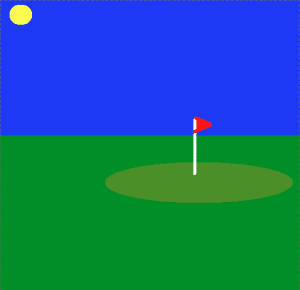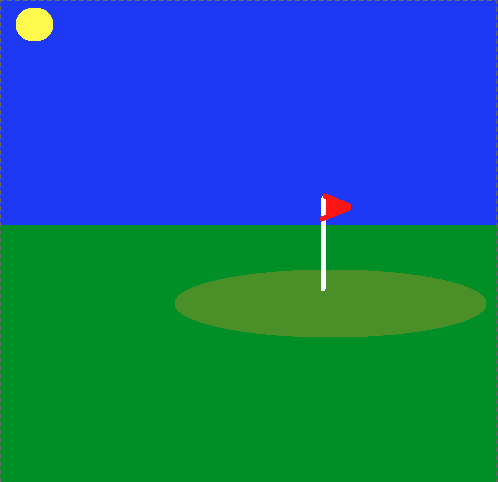I have titled the blog “NLP and golf” but it could apply any sport really, or any activity that you may do that involves achieving an objective using a skill.
The world of golf is a good example to use though, since it combines physical skill with a huge amount of mental strength. There are many many golfers who are specifically using the techniques in NLP to improve their game.
Ian Woosnam, former world number one golfer credited NLP with helping his game following a slump in his career, he said in the book Masterstroke “What I have learned from… books on NLP… has reminded me of the techniques, the thought processes and the state of mind that I enjoyed in my best years and which I feel I am rediscovering now – the ability to visualise shots before striking the ball, to remember, in an almost physical way, successful shots which I had hit in the past, to recreate ‘swing feelings’ and to blank out those unhelpful negative feelings…. NLP helped my game. It will help yours too.”
Let’s discuss the points that Ian raises.
NLP is all about enabling you to live your life in the way that you choose to live it. It is about giving you options in your thinking, so that if you want to produce more positive thoughts, more positive actions, then you are able to do that.
Golf is a long game. It takes a long time to complete a round of golf. You are talking about an average of four hours and for professional golfer, it could be as many as five hours. That is a lot of thinking time. Bearing in mind that the player only actually hits the ball about seventy times in five hours and each hit of the ball probably only takes two to three seconds.
So what do golfers spend their non shot time on the course thinking about? Well, they maybe talking to their playing partners, their caddie if they have one, they may be taking in the beautiful scenery, but most of the time they are thinking about the shot that they have coming up, and the shot that they have just played. And that is the problem!!
If you ask a professional golfer what percentage of their shots are perfect? Then they may say, five percent possibly. If you ask an amateur the same question, then the percentage will most likely be lower. So that means that if they are walking along thinking about their last shot, the chances are they are going to be thinking about what went wrong, what they did not do correctly, what they can learn from the last shot that will help them with the next shot. This is fine as a review of performance as long as those thoughts are left behind before they get to hit their next shot but that is not always what happens.
The trouble is that thinking negative thoughts is a habit, just as thinking positive thoughts is a habit. The mind can get into a routine of thinking negative thoughts. So what can happen is that you approach your next shot and as you think about that next shot you start thinking about what might go wrong.
“Oh, look at that big lake that I have got to hit over. My last shot was not very good, if I do that again I’ll be fishing it out of the lake!”
“Hmmm, this is a long putt. I have been leaving my putts short. I’m not very confident over this putt. I hope I don’t three putt again!”
….and guess what happens!
The fact is that in life you get what you focus on. Simple as that. If you are able to continually think about positive outcomes for your shots, then you will hit more of them. If you focus on what could go wrong, then your may realise your fear.
NLP can help in many ways to enable you to take control of your thinking. NLP makes use of a technique called anchoring to break the habit of negative thinking, to anchor in positive thoughts, to trigger positive thoughts in situations where negative ones would normally occur.
So, if you stand over a golf shot and you normally get a picture in your head of the ball going in the opposite direction to where you want it to go, you can anchor in a more positive picture of you hitting the ball down the middle of the fairway. Do you think that might be useful?
NLP enables you to design Strategies, thinking strategies that you can employ at the right time to enable you to think in a way that is most likely to enable you to get the result that you are after. Eg thinking about seeing the ball roll into the hole. Getting a great feeling about the ball going in the hole. Hearing the ball drop into the bottom of the hole.
NLP enables you to recognise when the negative mind patterns are beginning in order for you to stop them and replace them with more positive thoughts, ones that are going to produce a positive result for you.
 The three main “pillars” of NLP are, outcomes, acuity, and flexibility. That is, figure out the outcome that you require, use your powers of observation and feeling to monitor your progress towards that outcome and have flexibility in your approach so that if you notice that it is not working, then you can change your approach to achieve your outcome. These “pillars” of thinking are vital to success in sport and also in many areas of our life.
The three main “pillars” of NLP are, outcomes, acuity, and flexibility. That is, figure out the outcome that you require, use your powers of observation and feeling to monitor your progress towards that outcome and have flexibility in your approach so that if you notice that it is not working, then you can change your approach to achieve your outcome. These “pillars” of thinking are vital to success in sport and also in many areas of our life.
So yes, NLP can and will help golfers improve their games, and it will also help you achieve whatever you wish to achieve in life.
Live your life the way that you want to live it.
Excellence Assured provide NLP training at various UK training centres and we also train in NLP online. Train to be a Practitioner or even a Master Practitioner of NLP at our NLP online training centre.

